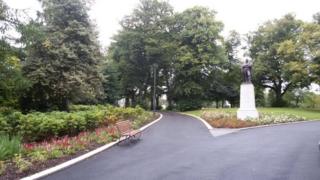Education & Family
-
Date:
-
9/9/2016
-
Time:
-
09:16:27
-
-

-
Source:
-
BBC News
-
-
-
Content:
-
Brooke Park in Londonderry has been reopened to the public after a multi-million pound redevelopment.
Located near the city centre, the historic park has been transformed to include a new cafe, a restored gate lodge and a synthetic football pitch.
The park was closed almost two years ago as part of a £5.6m regeneration project for the area.
It was funded by the Heritage Lottery Fund, Derry City and Strabane District Council and the Stormont executive.
Despite being reopened to the public, restoration work will continue at Brooke Park until the summer of 2017.
Brooke Park, also known as the Peoples Park, was formerly the site of the citys first orphanage.
The park holds strong memories for local residents, as its manager Colin Kennedy explained.
"The gates of the park have been opened so the peoples park is being brought back into public use," Mr Kennedy said.
"The park has very, very strong memories for both sides of the community, but as a consequence of the Troubles and a lack of investment the park really fell into a decline.
"So any opportunity to redress that need and invest in the parks fabric and the economic well-being of the people was snapped up," he added.
Publically maintained for over 100 years, the park owes its existence to two local philanthropists, John Gwyn and James Hood Brooke.
A Presbyterian benefactor, James Hood Brooke died on 2 August 1865, but in his final will and testament he revealed an important request - that the residue of his estate be used to acquire an area of land, that forever after would be a place of outdoor recreation for the citizens of Londonderry.
In particular, it was to be a place where the working man could enjoy the Sabbath day, his pipe and a pleasant walk after the labours of a severe weeks toil.
The site that the Brooke family eventually acquired was originally laid out in the Victorian era as part of a boys orphanage.
That was down to John Gwyn, a local businessman born near Muff, County Donegal, in 1754.
A successful linen merchant, Mr Gwyn died in 1829 and left the bulk of his wealth for the establishment of an orphanage in Derry.
The trustees of his will purchased the site for the sum of £200 on 9 September 1839.
The grounds to the orphanage included formal grass terraces, a pond, rose garden, shrubberies and boundary planting, a kitchen garden and orchards.
Although it was eventually demolished, the orphanage grounds survive along with the grass terraces and the location of the pond.
Last month, 30 descendents of John Gwyn travelled to Derry to get a sneak preview of the regeneration works.
Relatives travelled from New Zealand, Norway, Australia, and Scotland to see the new Gwyns Pavilion cafe.
A descendent closer to home, Roz Mitchell, from the Republic of Ireland, said she was honoured to learn of John Gwyns legacy.
"He was a poor boy made good, so to speak, who seems to have been very committed to philanthropy and spending his money for the orphans having been fatherless himself," she said.
"Its extremely interesting to have the historical connection, its really good to have a sense of where you come from and what the past is for this city."
-
Orignial Link :
-
http://www.bbc.com/news/uk-northern-ireland-foyle-west-37315910
-
crawlTime:
-
9/12/2016 3:02:33 PM
Back to List
All Comments
|
UserName
|
commentContent
|
numOfComentLikes
|
Datetime
|
|
ADD A COMMENT
